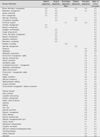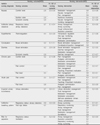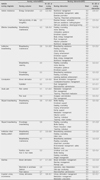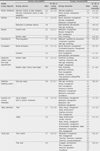Abstract
Purpose
The purpose of this study was to identify NANDA, NIC, and NOC frequently used and their linkages in major nursing departments for development of the nursing process and nursing management system.
Methods
This study was a descriptive study. Data were collected from 123 nurses who worked in medical, surgical, pediatric, gynecologic, and psychiatric department. The questionnaire was based on the NANDA, NOC, NIC, and NANDA-NOC-NIC linkage system. This research was analyzed by an EXCEL program and SPSS Pc+15.0.
Results
Nursing diagnoses frequently used were 'anxiety', 'disturbed sleep pattern', 'activity intolerance', 'social isolation', 'nausea', 'ineffective airway clearance', 'chronic pain', nursing outcomes frequently used were 'thermoregulation', 'bowel elimination', 'pain control', 'vital sign status', 'pain level', and nursing interventions frequently used were 'nausea management', 'airway suctioning', 'bowel elimination management', 'diarrhea management', 'medication management'. NANDA-NOC-NIC linkages in major nursing departments were recognized, and these results were similar to the results of other researches.
Figures and Tables
References
1. Bulecheck G, Butcher HK, McCloskey DJ. Nursing Interventions Classification. 2007. St. Louis: Mosby.
2. Behrenbeck JG, Timm JA, Griebenow LK, Demmer KA. Nursing-Sensitive Outcome Reliability Testing in a Tertiary Care Setting. Int J Nurs Terminol Classif. 2005. 16(1):14–20.

3. Cavendish R. School nurses' use of NANDA, NIC, and NOC to describe children's abdominal pain. Int J Nurs Terminol Classif. 2003. 14:4 Suppl. 17–18.

4. Choi YH, Rhee HR, Kim HS, Kim SS, Park KO. A Survey Study of Nursing Diagnosis Use in Clinical Practice. J Korean Acad Nurs. 1996. 26(4):930–945.

5. Choi SH, Choi BH, Ji HR, Lee EJ, Kim HS, Park MJ. Standardized NANDA, NOC, NIC linkage. 2006. Seoul: Hyunmoonsa.
6. Jee MK. Linkages of nursing diagnosis, nursing intervention, and nursing outcome classification of breast cancer patients using nursing database. 2003. Seoul: Junang National University;Unpublished doctoral dissertation.
7. Hughes R. The use of NANDA, NIC, and NOC in the identification and measurement of problems, interventions, and outcomes in spinal cord injury. Int J Nurs Terminol Classif. 2003. 14:4 Suppl. 18–19.

8. Kim YH. Validation of the Nursing Outcomes to Cerebrovascular Patients using Iowa NOC. 2003. Kwangju: Jun Nam University;Unpublished master's thesis.
9. Keenan GM, Kileen MB, Clingerman E. NANDA, NIC, and NOC; progress toward a nursing information infrastructure. Nurs Educ Perspect. 2002. 23(4):162–163.
10. Kim HS. Development and application of the computerized nursing process program for orthopedic surgery inpatients. 2004. Kwangju: JunNam University;Unpublished doctoral dissertation.
11. Ko E. Construction of nursing information system using NANDA-NOC-NIC linkage in medical.-surgical nursing departments. 2008. Daejeon: Chongnam National University;Unpublished doctoral dissertation.
12. Kim JA. Development of knowledge management system of nursing process for clinical application. 2001. Seoul: Yonsae University;Unpublished master's thesis.
13. Ji MK. Linkages of nursing diagnosis, nursing intervention and nursing outcome classification of breast cancer patients using nursing database. 2005. Seoul: Chung Ang university;Unpublished master's thesis.
14. Johnson M, Bulecheck G, Moorhedad S, Butcher HK, Mass ML, Swanson E, McCloskey J. NANDA, NOC, and NIC Linkages. 2005. Mosby: St. Louis.
15. Lee EJ, Choi IH. Comparison on Nursing Importance and Performance of Nursing Interventions linked to Nursing Diagnoses-focused on 5 NANDA Nursing Diagnoses. J Korean Acad Nurs. 2003. 33(2):210–219.

16. Lee EO, Song MS, Kim MK, Park HA. Development of a Nursing Diagnosis System Using a Neural Network Model. J Nurs Acad Soc. 1996. 26(2):281–289.

17. Lee MG. Development of nursing diagnosis, nursing outcomes, nursing interventions linking protocol for patients in the postanesthetic care department. 2004. Seoul: Ewha University;Unpublished doctoral dissertation.
18. Lee SJ, Lee MY. Analysis of nursing intervention studies published by the Journal of Korean Academy of Psychiatric and Mental Health Nursing using the NANDA, NIC, and NOC. J Korean Acad Psychiatr Ment Health Nurs. 2007. 16(4):377–388.
19. Lee SH. Development of an NOC applied nursing outcomes evaluation tool for abdominal surgery patients. 2004. Daegu: Keimyung University;Unpublished master's thesis.
20. Lee EJ. Identification of nursing diagnosis-outcome-intervention (NANDA-NOC-NIC) Linkage in Surgical Nursing department. 2005. Daejeon: Chonnam University;Unpublished doctoral dissertation.
21. McCloskey J, Bulechek G, Donahue W. Nursing Interventions frequent to specialty practice. Nurs Outlook. 1998. 46(2):67–76.
22. Moorhead S, Johnson M, Mass ML, Swanson E. Nursing outcomes classification. 2007. St. Louis: Mosby.
23. NANDA International. Nursing Diagnoses: definitions & Classification. 2007-2008. 2007. Philadaphia: NANDA International.
24. Prophet CM, Delaney CW. Nursing Outcomes Classification: Implications for Nursing information Systems and the computer-based patient record. J Nurs Care Qual. 1998. 12(5):21–29.

25. Park KS, Lee JH. An analysis of nursing diagnoses using NANDA classification. J Korean Acad Adult Nurs. 1989. 1(1):172–189.
26. Park HA, Kim JE. A comparative analysis of nursing diagnoses and outcome classification. Seoul J Nurs. 1998. 12(1):15–31.
27. Park HJ. Development and application of the computerized nursing process program using nursing diagnosis-outcome-intervention (NANDA-NOC-NIC) Linkage. 2003. Kwangju: Chonam National University;Unpublished doctoral dissertation.
28. Reu HS. Construction of linkage database on nursing diagnoses, interventions, outcomes in abdominal surgery patients. 2001. Seoul: Jun Ang University;Unpublished doctoral dissertation.
29. Seo MK, Lee SM, Lee NJ, Kim JA, Hong HS, Kim EY, Kim EK, Lee SJ, Han YH, Kow MS, et al. Nursing informatics and the foundation of knowledge. 2009. Seoul: Fornurse.
30. Sun MH, Hong YH, Jung HM. Nursing diagnosis classification. 2003. Seoul: SuMoonSa.
31. Yom YH, Lee GE. Validation of nursing-sensitive patient outcomes: focused on abuse outcomes. J Korean Acad Womens Health Nurs. 2000. 6(4):506–515.




 PDF
PDF ePub
ePub Citation
Citation Print
Print











 XML Download
XML Download